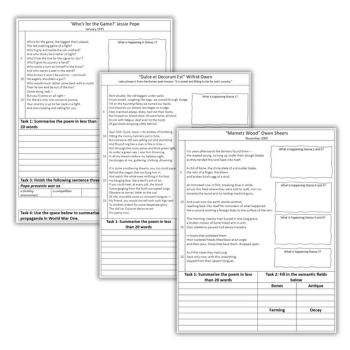Introduce your Year 9 students to the compelling themes of power and conflict with this comprehensive war poems resource.
Perfectly tailored to the curriculum, this resource features a carefully chosen selection of poems that explore the:
- physical and emotional impact of war
- dynamics of authority
- personal stories that emerge from conflict
Each poem is accompanied by structured activities designed to deepen understanding of poetic techniques, thematic content and historical context.
Activities
This resource provides students with a variety of tasks that encourage deep engagement with the poems. For each piece, students begin by summarising the overall message in a concise way. This helps them to distil the key themes.
They then explore the semantic fields used by the poets. They need to identify recurring words and imagery to uncover how language shapes meaning.
Analytical tasks prompt students to interpret the portrayal of power, conflict and human suffering, using specific evidence from the texts to support their ideas.
Additionally, creative tasks challenge students to complete sentences such as “The poet presents war as…” to encourage critical thinking and reinforce their understanding of the poet’s intentions.
Contextual activities invite students to reflect on the historical background of each poem, such as propaganda during WW1, the realities of life in the trenches or the lasting psychological impacts of modern conflict.
Through structured activities, students build their skills in comparing poems, evaluating the impact of literary devices and forming well-supported interpretations. This is all essential preparation for GCSE English Literature.
The flexible design of this resource allows you to incorporate the activities into full schemes of work or use them as supplementary tasks to enrich your lessons.
Power and conflict poems
With works by poets such as Jessie Pope, Wilfred Owen, Siegfried Sassoon and Imtiaz Dharker, the collection spans historical and contemporary perspectives.
From the propaganda-fuelled optimism of Who’s for the Game? to the raw, haunting imagery of Dulce et Decorum Est and the deeply personal exploration of loss in Mametz Wood, the poems invite students to reflect on the power struggles and human cost of war.
By downloading this resource, you’ll equip your students with the tools to critically engage with poetry and develop a nuanced understanding of the profound ways in which power and conflict shape human experiences.
Inspire thought-provoking discussions and meaningful learning outcomes with this expertly crafted resource for Year 9.
Ameena Mahetar is a KS3 English lead. Follow her on X at @Ameenamahetar1














